Charles E W Bean, Diaries, AWM38 3DRL 606/261/1 - 1929 - 1930 - Part 11
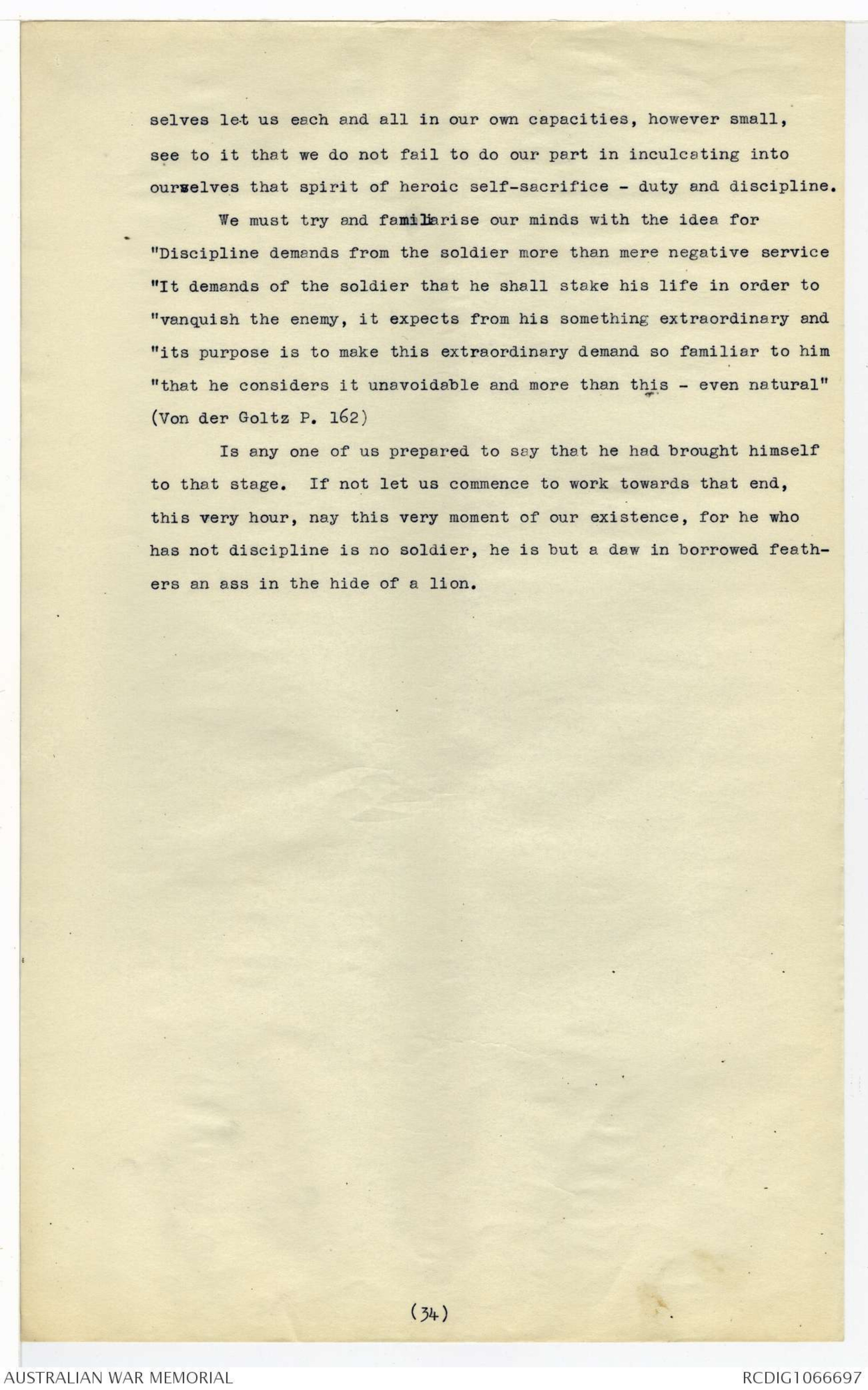
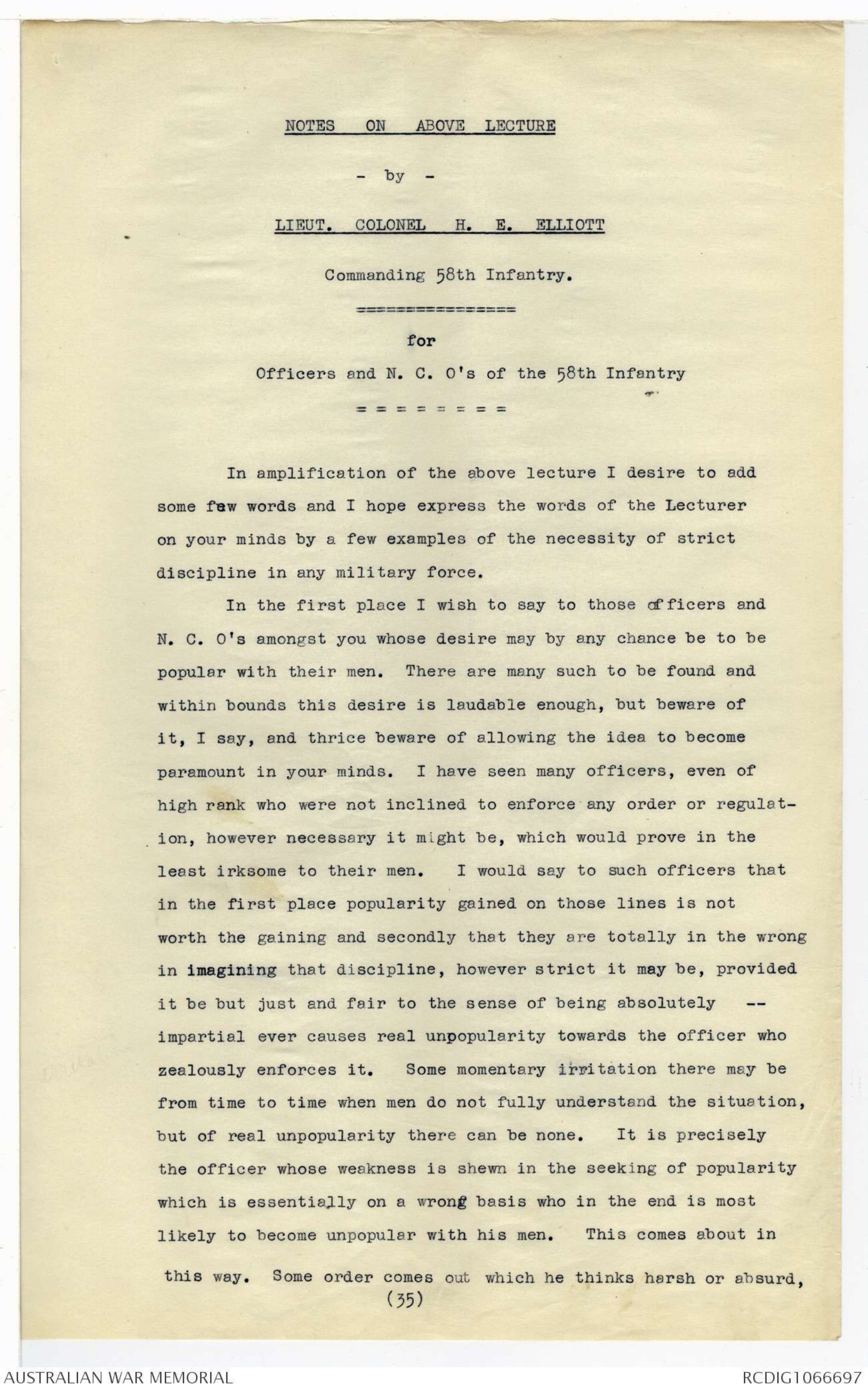
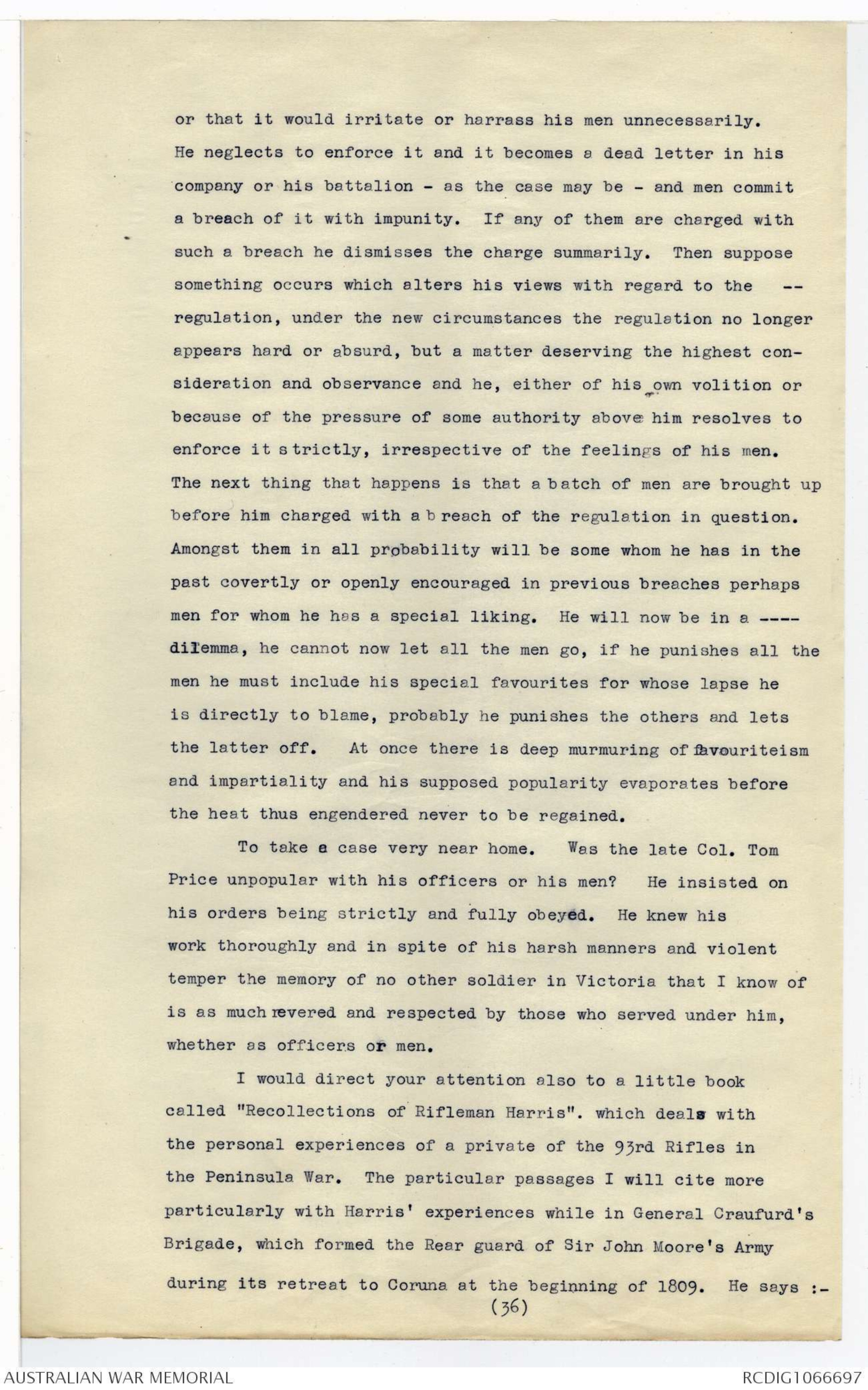
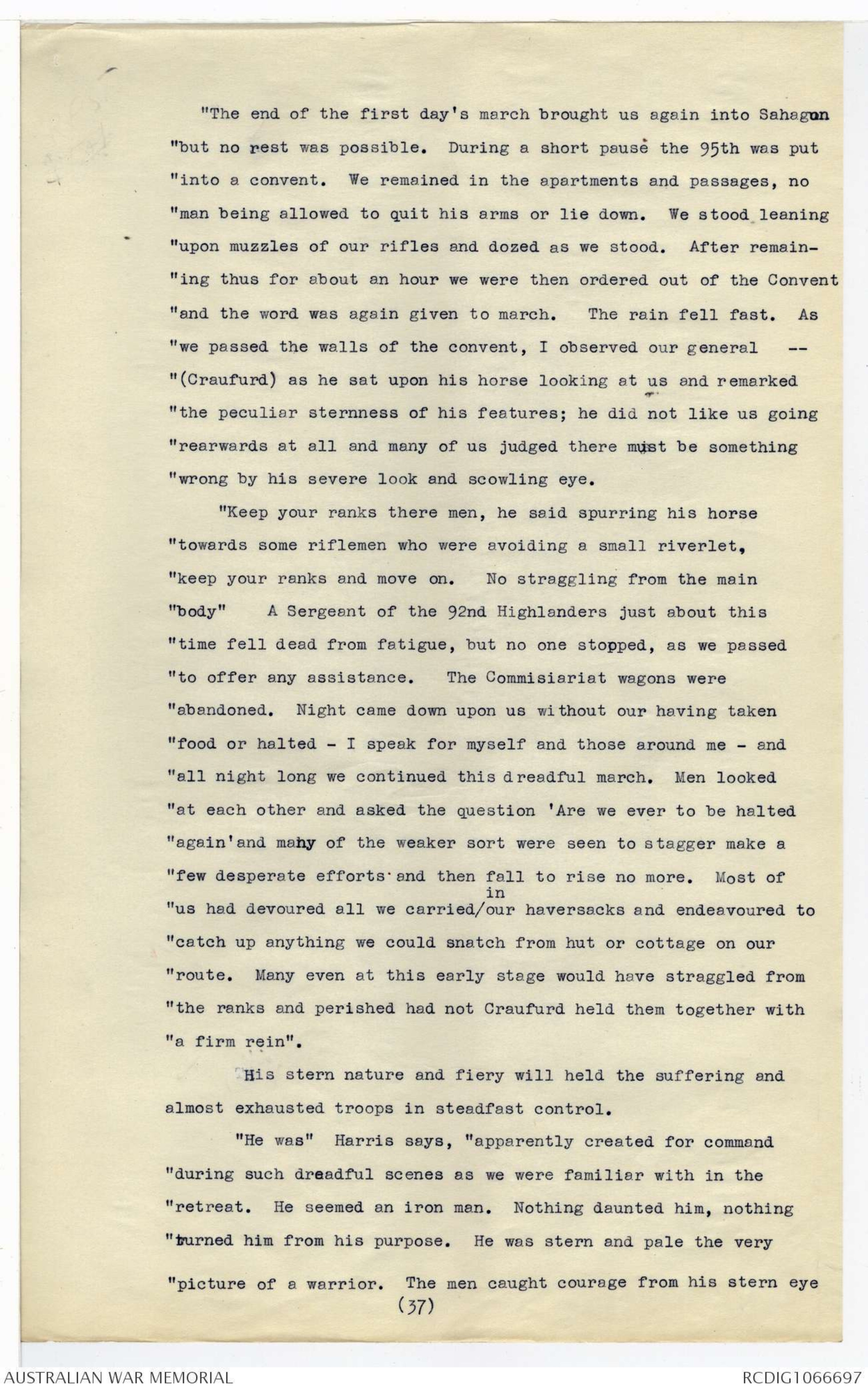
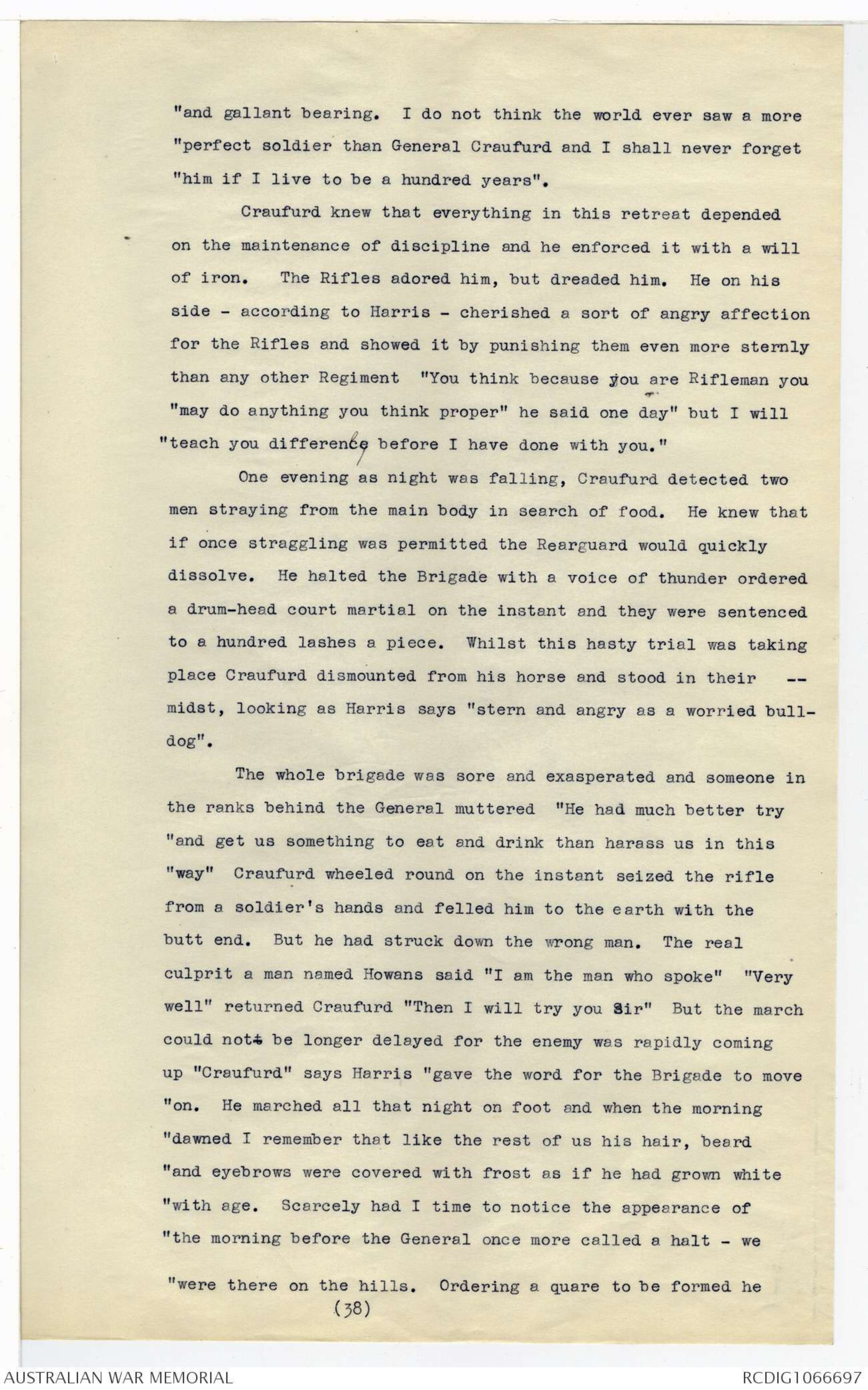
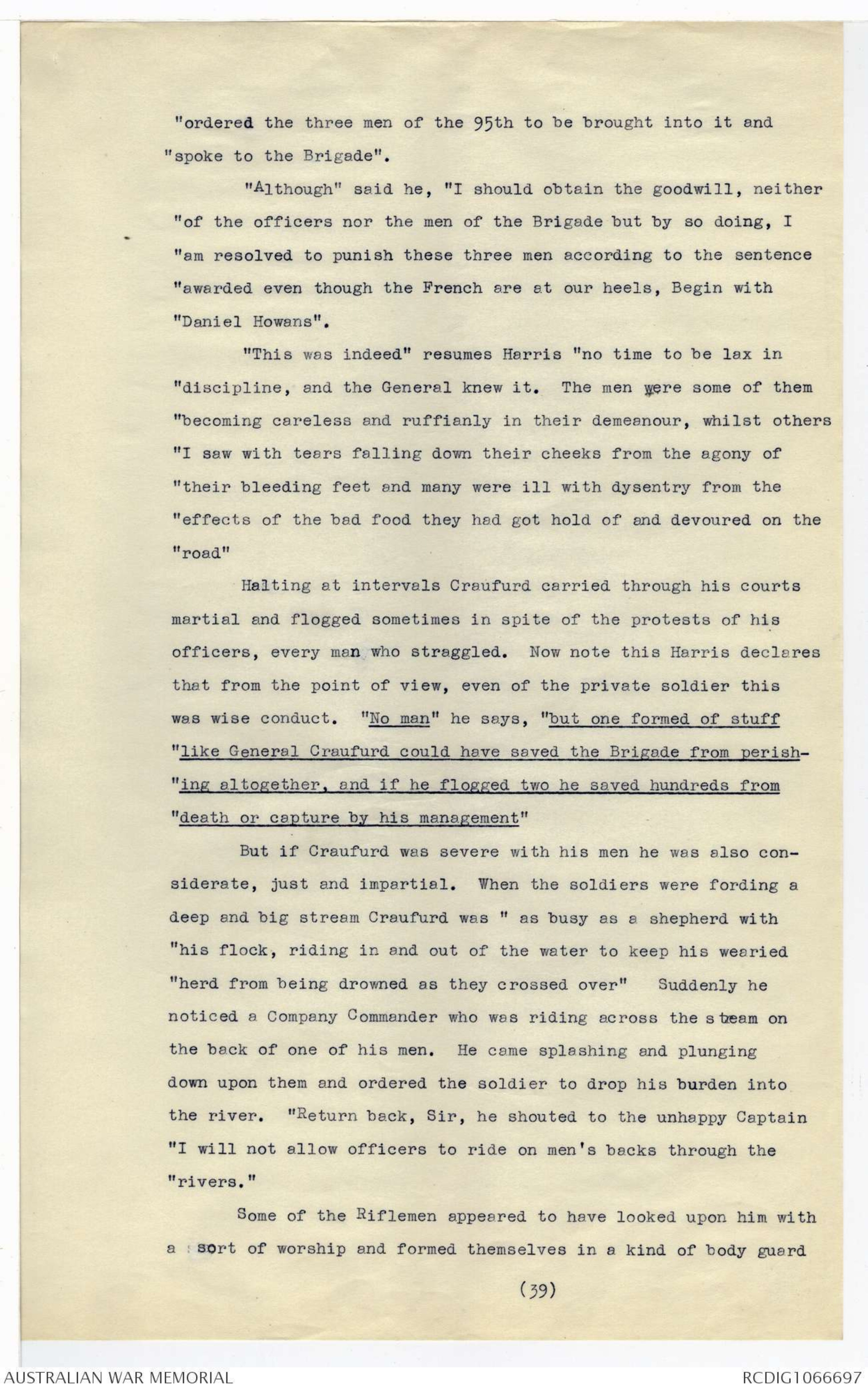
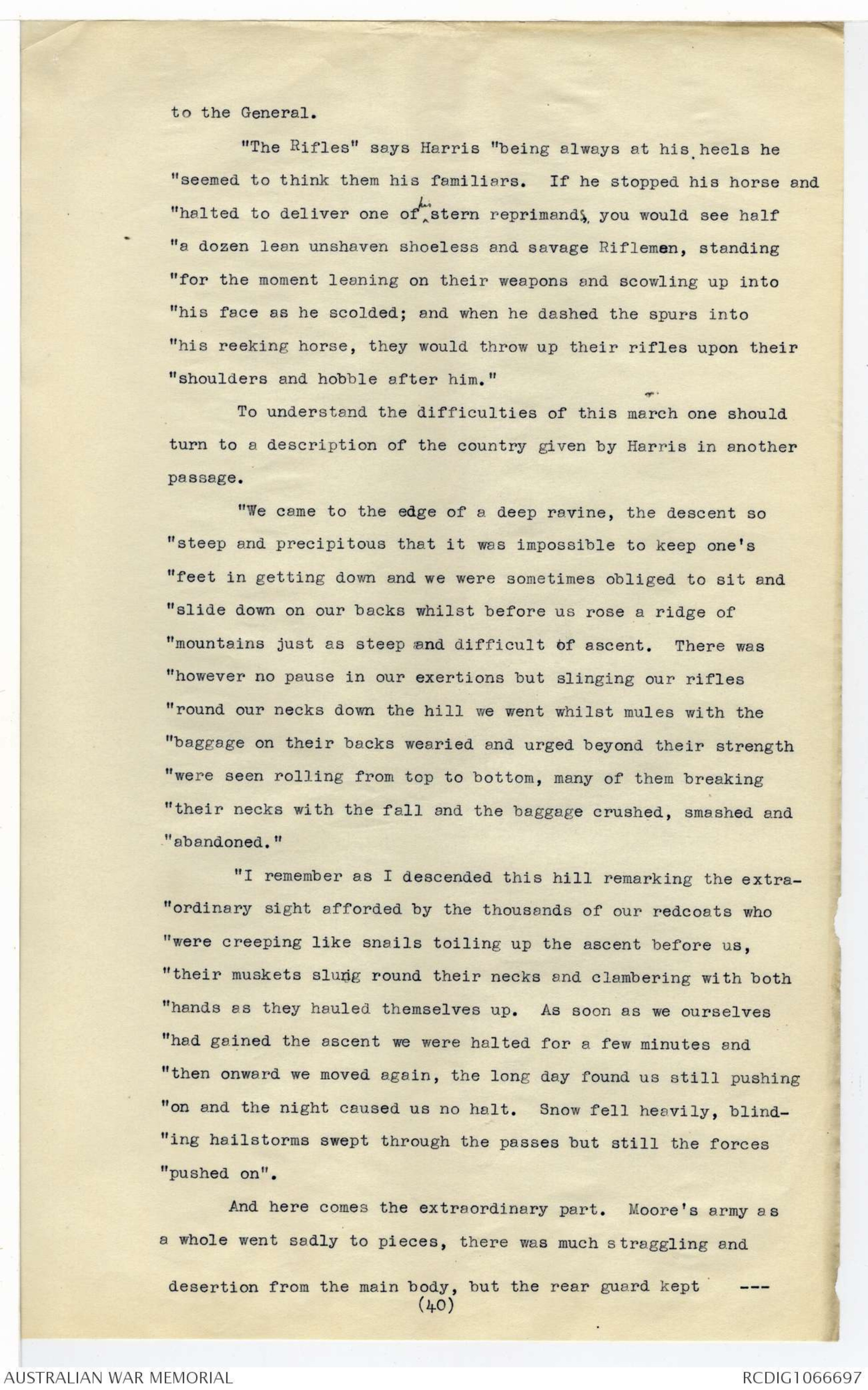
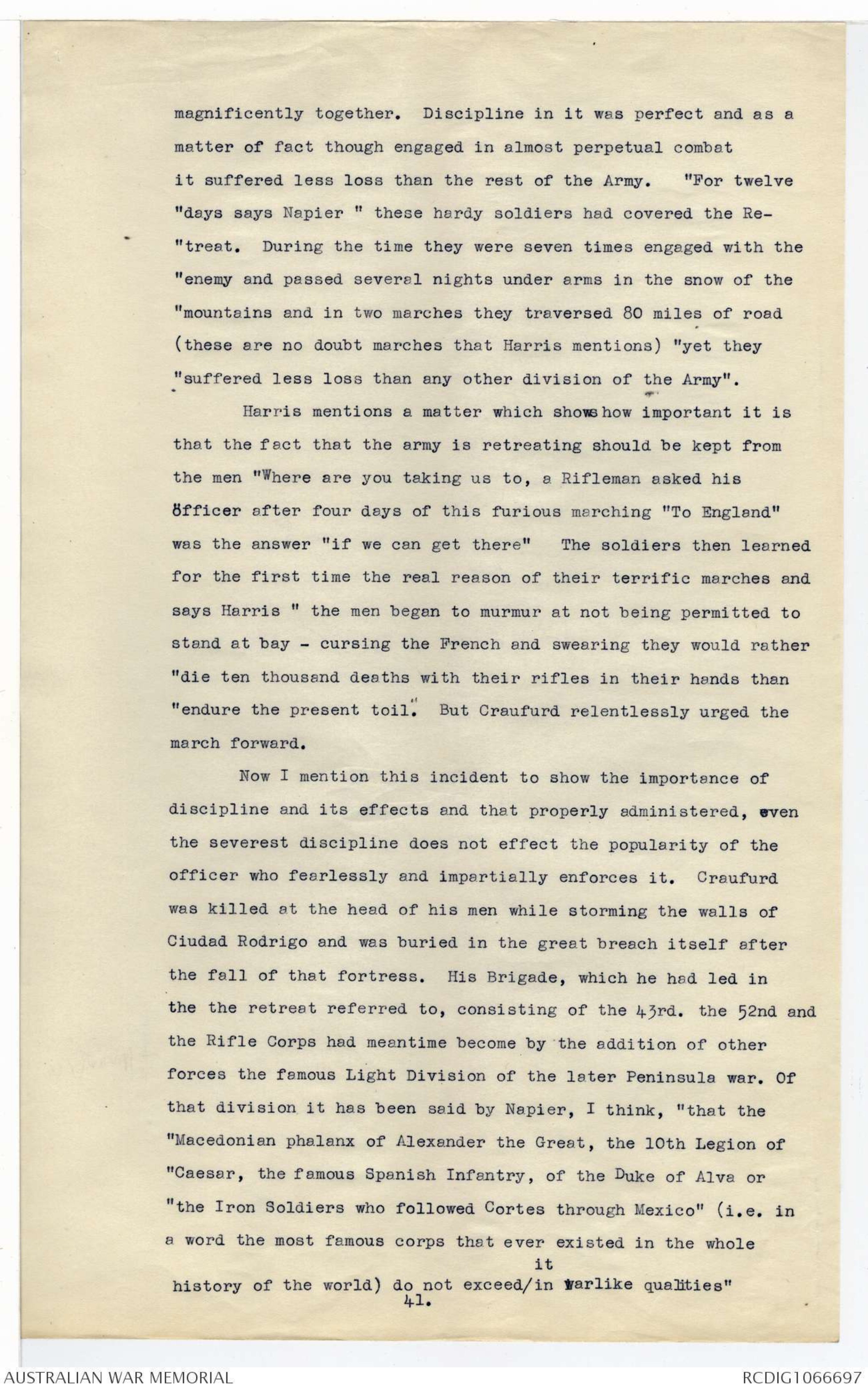
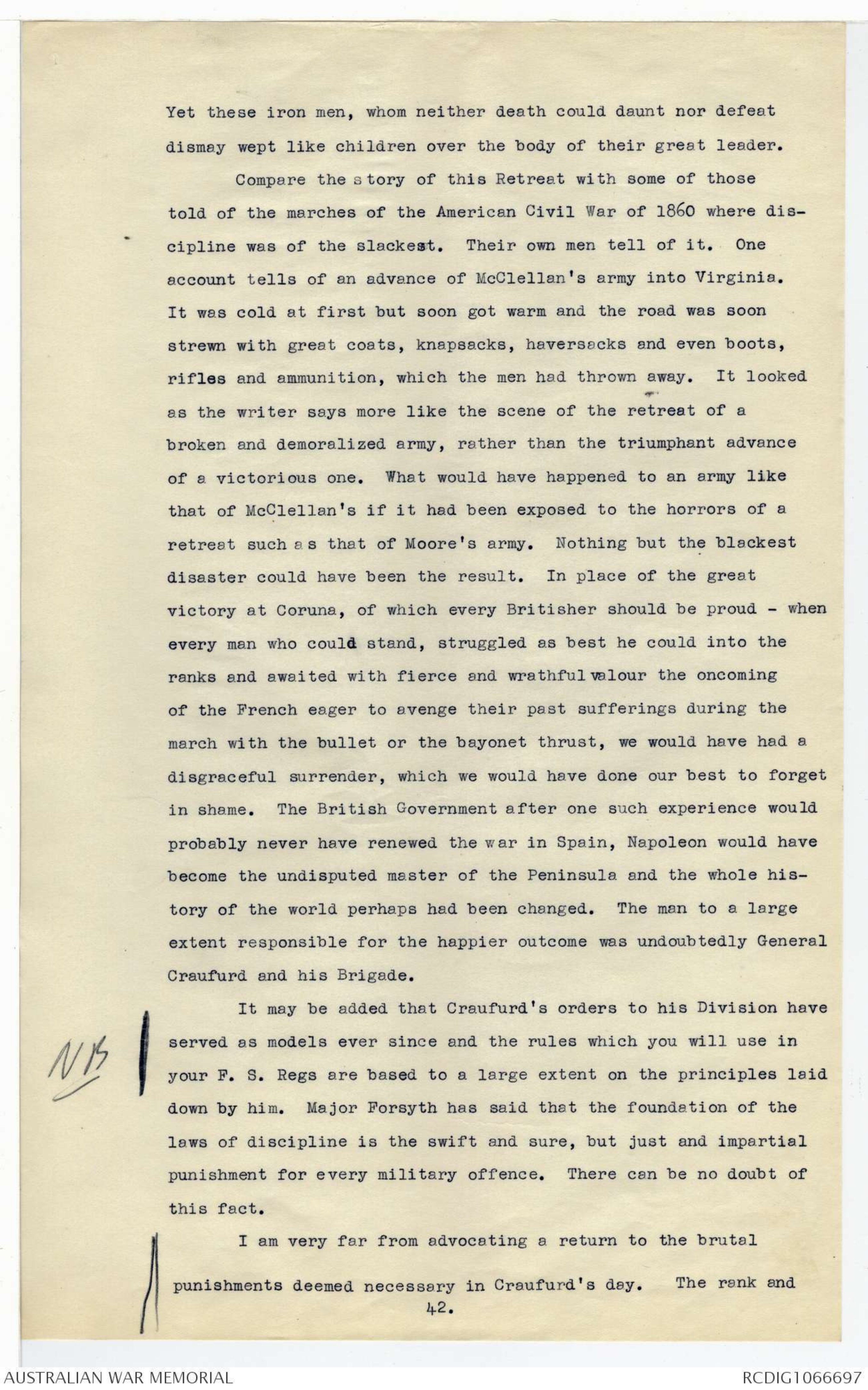
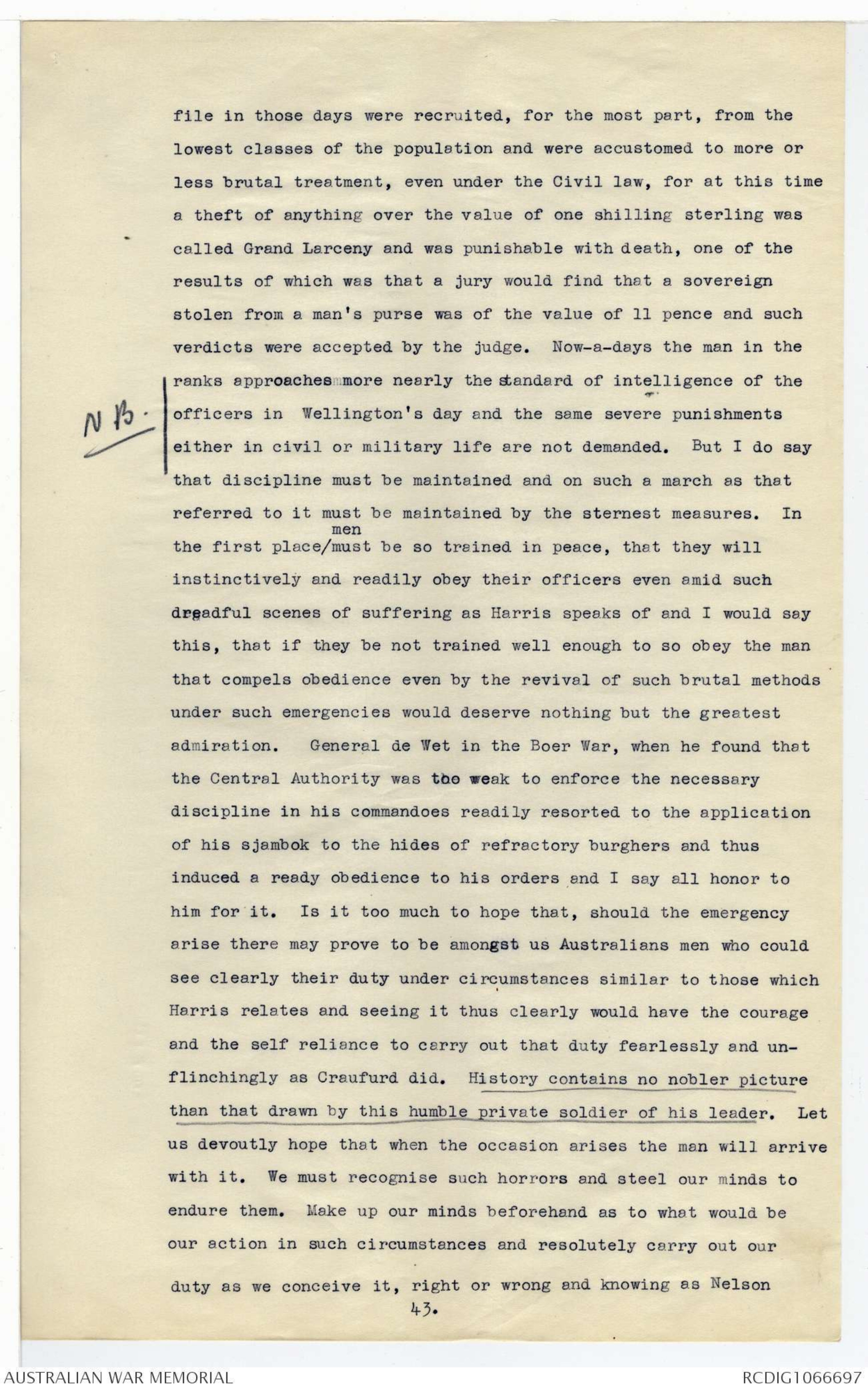
selves let us each and all in our own capacities, however small,
see to it that we do not fail to do our part in inculcating into
ourselves that spirit of heroic self-sacrifice - duty and discipline.
We must try and familiarise our minds with the idea for
"Discipline demands from the soldier more than mere negative service
"It demands of the soldier that he shall stake his life in order to
"vanquish the enemy, it expects from his something extraordinary and
"its purpose is to make this extraordinary demand so familiar to him
"that he considers it unavoidable and more than this - even natural"
(Von der Goltz P. 162)
Is any one of us prepared to say that he had brought himself
to that stage. If not let us commence to work towards that end,
this very hour, nay this very moment of our existence, for he who
has not discipline is no soldier, he is but a daw in borrowed feathers
an ass in the hide of a lion.
(34)
NOTES ON ABOVE LECTURE
- by -
LIEUT. COLONEL H. E. ELLIOTT
Commanding 58th Infantry.
for
Officers and N. C. O's of the 58th Infantry
In amplification of the above lecture I desire to add
some few words and I hope express the words of the Lecturer
on your minds by a few examples of the necessity of strict
discipline in any military force.
In the first place I wish to say to those officers and
N. C. O's amongst you whose desire may by any chance be to be
popular with their men. There are many such to be found and
within bounds this desire is laudable enough, but beware of
it, I say, and thrice beware of allowing the idea to become
paramount in your minds. I have seen many officers, even of
high rank who were not inclined to enforce any order or regulation,
however necessary it might be, which would prove in the
least irksome to their men. I would say to such officers that
in the first place popularity gained on those lines is not
worth the gaining and secondly that they are totally in the wrong
in imagining that discipline, however strict it may be, provided
it be but just and fair to the sense of being absolutely --
impartial ever causes real unpopularity towards the officer who
zealously enforces it. Some momentary irritation there may be
from time to time when men do not fully understand the situation,
but of real unpopularity there can be none. It is precisely
the officer whose weakness is shewn in the seeking of popularity
which is essentially on a wrong basis who in the end is most
likely to become unpopular with his men. This comes about in
this way. Some order comes out which he thinks harsh or absurd,
(35)
or that it would irritate or harrass his men unnecessarily.
He neglects to enforce it and it becomes a dead letter in his
company or his battalion - as the case may be - and men commit
a breach of it with impunity. If any of them are charged with
such a breach he dismisses the charge summarily. Then suppose
something occurs which alters his views with regard to the --
regulation, under the new circumstances the regulation no longer
appears hard or absurd, but a matter deserving the highest consideration
and observance and he, either of his own volition or
because of the pressure of some authority above him resolves to
enforce it strictly, irrespective of the feelings of his men.
The next thing that happens is that a batch of men are brought up
before him charged with a breach of the regulation in question.
Amongst them in all probability will be some whom he has in the
past covertly or openly encouraged in previous breaches perhaps
men for whom he has a special liking. He will now be in a ----
dilemma, he cannot now let all the men go, if he punishes all the
men he must include his special favourites for whose lapse he
is directly to blame, probably he punishes the others and lets
the latter off. At once there is deep murmuring of favouriteism
and impartiality and his supposed popularity evaporates before
the heat thus engendered never to be regained.
To take a case very near home. Was the late Col. Tom
Price unpopular with his officers or his men? He insisted on
his orders being strictly and fully obeyed. He knew his
work thoroughly and in spite of his harsh manners and violent
temper the memory of no other soldier in Victoria that I know of
is as much revered and respected by those who served under him,
whether as officers or men.
I would direct your attention also to a little book
called "Recollections of Rifleman Harris". which deals with
the personal experiences of a private of the 93rd Rifles in
the Peninsula War. The particular passages I will cite more
particularly with Harris' experiences while in General Craufurd's
Brigade, which formed the Rear guard of Sir John Moore's Army
during its retreat to Coruna at the beginning of 1809. He says :-
(36)
"The end of the first day's march brought us again into Sahagun
"but no rest was possible. During a short pause the 95th was put
"into a convent. We remained in the apartments and passages, no
"man being allowed to quit his arms or lie down. We stood leaning
"upon muzzles of our rifles and dozed as we stood. After remaining
"thus for about an hour we were then ordered out of the Convent
"and the word was again given to march. The rain fell fast. As
"we passed the walls of the convent, I observed our general --
"(Craufurd) as he sat upon his horse looking at us and remarked
"the peculiar sternness of his features; he did not like us going
"rearwards at all and many of us judged there must be something
"wrong by his severe look and scowling eye.
"Keep your ranks there men, he said spurring his horse
"towards some riflemen who were avoiding a small riverlet,
"keep your ranks and move on. No straggling from the main
"body" A Sergeant of the 92nd Highlanders just about this
"time fell dead from fatigue, but no one stopped, as we passed
"to offer any assistance. The Commisiariat wagons were
"abandoned. Night came down upon us without our having taken
"food or halted - I speak for myself and those around me - and
"all night long we continued this dreadful march. Men looked
"at each other and asked the question 'Are we ever to be halted
"again' and many of the weaker sort were seen to stagger make a
"few desperate efforts and then fall to rise no more. Most of
"us had devoured all we carried ^in our haversacks and endeavoured to
"catch up anything we could snatch from hut or cottage on our
"route. Many even at this early stage would have straggled from
"the ranks and perished had not Craufurd held them together with
"a firm rein".
His stern nature and fiery will held the suffering and
almost exhausted troops in steadfast control.
"He was" Harris says, "apparently created for command
"during such dreadful scenes as we were familiar with in the
"retreat. He seemed an iron man. Nothing daunted him, nothing
"turned him from his purpose. He was stern and pale the very
"picture of a warrior. The men caught courage from his stern eye
(37)
"and gallant bearing. I do not think the world ever saw a more
"perfect soldier than General Craufurd and I shall never forget
"him if I live to be a hundred years".
Craufurd knew that everything in this retreat depended
on the maintenance of discipline and he enforced it with a will
of iron. The Rifles adored him, but dreaded him. He on his
side - according to Harris - cherished a sort of angry affection
for the Rifles and showed it by punishing them even more sternly
than any other Regiment "You think because you are Rifleman you
"may do anything you think proper" he said one day" but I will
"teach you difference before I have done with you."
One evening as night was falling, Craufurd detected two
men straying from the main body in search of food. He knew that
if once straggling was permitted the Rearguard would quickly
dissolve. He halted the Brigade with a voice of thunder ordered
a drum-head court martial on the instant and they were sentenced
to a hundred lashes a piece. Whilst this hasty trial was taking
place Craufurd dismounted from his horse and stood in their --
midst, looking as Harris says "stern and angry as a worried bulldog".
The whole brigade was sore and exasperated and someone in
the ranks behind the General muttered "He had much better try
"and get us something to eat and drink than harass us in this
"way" Craufurd wheeled round on the instant seized the rifle
from a soldier's hands and felled him to the earth with the
butt end. But he had struck down the wrong man. The real
culprit a man named Howans said "I am the man who spoke" "Very
well" returned Craufurd "Then I will try you Sir" But the march
could nott be longer delayed for the enemy was rapidly coming
up "Craufurd" says Harris "gave the word for the Brigade to move
"on. He marched all that night on foot and when the morning
"dawned I remember that like the rest of us his hair, beard
"and eyebrows were covered with frost as if he had grown white
"with age. Scarcely had I time to notice the appearance of
"the morning before the General once more called a halt - we
"were there on the hills. Ordering a quare to be formed he
(38)
"ordered the three men of the 95th to be brought into it and
"spoke to the Brigade".
"Although" said he, "I should obtain the goodwill, neither
"of the officers nor the men of the Brigade but by so doing, I
"am resolved to punish these three men according to the sentence
"awarded even though the French are at our heels, Begin with
"Daniel Howans".
"This was indeed" resumes Harris "no time to be lax in
"discipline, and the General knew it. The men were some of them
"becoming careless and ruffianly in their demeanour, whilst others
"I saw with tears falling down their cheeks from the agony of
"their bleeding feet and many were ill with dysentry from the
"effects of the bad food they had got hold of and devoured on the
"road"
Halting at intervals Craufurd carried through his courts
martial and flogged sometimes in spite of the protests of his
officers, every man who straggled. Now note this Harris declares
that from the point of view, even of the private soldier this
was wise conduct. "No man" he says,' "but one formed of stuff
"like General Craufurd could have saved the Brigade from perishing
"altogether, and if he flogged two he saved hundreds from
"death or capture by his management"
But if Craufurd was severe with his men he was also considerate,
just and impartial. When the soldiers were fording a
deep and big stream Craufurd was " as busy as a shepherd with
"his flock, riding in and out of the water to keep his wearied
"herd from being drowned as they crossed over". Suddenly he
noticed a Company Commander who was riding across the stream on
the back of one of his men. He came splashing and plunging
down upon them and ordered the soldier to drop his burden into
the river. "Return back, Sir, he shouted to the unhappy Captain
"I will not allow officers to ride on men's backs through the
"rivers."
Some of the Riflemen appeared to have looked upon him with
a sort of worship and formed themselves in a kind of body guard
(39)
to the General.
"The Rifles" says Harris "being always at his heels he
"seemed to think them his familiars. If he stopped his horse and
"halted to deliver one of ^his his stern reprimands, you would see half
"a dozen lean unshaven shoeless and savage Riflemen, standing
"for the moment leaning on their weapons and scowling up into
"his face as he scolded; and when he dashed the spurs into
"his reeking horse, they would throw up their rifles upon their
"shoulders and hobble after him."
To understand the difficulties of this march one should
turn to a description of the country given by Harris in another
passage.
"We came to the edge of a deep ravine, the descent so
"steep and precipitous that it was impossible to keep one's
"feet in getting down and we were sometimes obliged to sit and
"slide down on our backs whilst before us rose a ridge of
"mountains just as steep and difficult of ascent. There was
"however no pause in our exertions but slinging our rifles
"round our necks down the hill we went whilst mules with the
"baggage on their backs wearied and urged beyond their strength
"were seen rolling from top to bottom, many of them breaking
"their necks with the fall and the baggage crushed, smashed and
"abandoned."
"I remember as I descended this hill remarking the extraordinary "sight afforded by the thousands of our redcoats who
"were creeping like snails toiling up the ascent before us,
"their muskets slung round their necks and clambering with both
"hands as they hauled themselves up. As soon as we ourselves
"had gained the ascent we were halted for a few minutes and
"then onward we moved again, the long day found us still pushing
"on and the night caused us no halt. Snow fell heavily, blinding "hailstorms swept through the passes but still the forces
"pushed on".
And here comes the extraordinary part. Moore's army as
a whole went sadly to pieces, there was much straggling and
desertion from the main body, but the rear guard kept ---
(40)
magnificently together. Discipline in it was perfect and as a
matter of fact though engaged in almost perpetual combat
it suffered less loss than the rest of the Army. "For twelve
"days says Napier "these hardy soldiers had covered the Retreat.
"During the time they were seven times engaged with the
"enemy and passed several nights under arms in the snow of the
"mountains and in two marches they traversed 80 miles of road
"(these are no doubt marches that Harris mentions) "yet they
"suffered less loss than any other division of the Army".
Harris mentions a matter which shows how important it is
that the fact that the army is retreating should be kept from
the men "Where are you taking us to, a Rifleman asked his
officer after four days of this furious marching "To England"
was the answer "if we can get there" The soldiers then learned
for the first time the real reason of their terrific marches and
says Harris " the men began to murmur at not being permitted to
stand at bay - cursing the French and swearing they would rather
"die ten thousand deaths with their rifles in their hands than
"endure the present toil. " But Craufurd relentlessly urged the
march forward.
Now I mention this incident to show the importance of
discipline and its effects and that properly administered, even
the severest discipline does not effect the popularity of the
officer who fearlessly and impartially enforces it. Craufurd
was killed at the head of his men while storming the walls of
Ciudad Rodrigo and was buried in the great breach itself after
the fall of that fortress. His Brigade, which he had led in
the the retreat referred to, consisting of the 43rd. the 52nd and
the Rifle Corps had meantime become by the addition of other
forces the famous Light Division of the later Peninsula war. Of
that division it has been said by Napier, I think, " that the
"Macedonian phalanx of Alexander the Great, the 10th Legion of
"Caesar, the famous Spanish Infantry, of the Duke of Alva or
"the Iron Soldiers who followed Cortes through Mexico" (i.e. in
a word the most famous corps that ever existed in the whole
history of the world) do not exceed ^it in warlike qualities"
41.
Yet these iron men, whom neither death could daunt nor defeat
dismay wept like children over the body of their great leader.
Compare the story of this Retreat with some of those
told of the marches of the American Civil War of 1860 discipline
was of the slackest. Their own men tell of it. One
account tells of an advance of McClellan's army into Virginia.
It was cold at first but soon got warm and the road was soon
strewn with great coats, knapsacks, haversacks and even boots,
rifles and ammunition, which the men had thrown away. It looked
as the writer says more like the scene of the retreat of a
broken and demoralized army, rather than the triumphant advance
of a victorious one. What would have happened to an army like
that of McClellan's if it had been exposed to the horrors of a
retreat such as that of Moore's army. Nothing but the blackest
disaster could have been the result. In place of the great
victory at Coruna, of which every Britisher should be proud - when
every man who could stand, struggled as best he could into the
ranks and awaited with fierce and wrathful valour the oncoming
of the French eager to avenge their past sufferings during the
march with the bullet or the bayonet thrust, we would have had a
disgraceful surrender, which we would have done our best to forget
in shame. The British Government after one such experience would
probably never have renewed the war in Spain, Napoleon would have
become the undisputed master of the Peninsula and the whole history
of the world perhaps had been changed. The man to a large
extent responsible for the happier outcome was undoubtedly General
Craufurd and his Brigade.
[*NB*] It may be added that Craufurd's orders to his Division have
served as models ever since and the rules which you will use in
your F. S. Regs are based to a large extent on the principles laid
down by him. Major Forsyth has said that the foundation of the
laws of discipline is the swift and sure, but just and impartial
punishment for every military offence. There can be no doubt of
this fact.
I am very far from advocating a return to the brutal
punishments deemed necessary in Craufurd's day. The rank and
42.
file in those days were recruited, for the most part, from the
lowest classes of the population and were accustomed to more or
less brutal treatment, even under the Civil law, for at this time
a theft of anything over the value of one shilling sterling was
called Grand Larceny and was punishable with death, one of the
results of which was that a jury would find that a sovereign
stolen from a man's purse was of the value of 11 pence and such
verdicts were accepted by the judge. Now-a-days the man in the
ranks approaches more nearly the standard of intelligence of the
[*N.B.*] officers in Wellington's day and the same severe punishments
either in civil or military life are not demanded. But I do say
that discipline must be maintained and on such a march as that
referred to it must be maintained by the sternest measures. In
the first place ^men must be so trained in peace, that they will
instinctively and readily obey their officers even amid such
dreadful scenes of suffering as Harris speaks of and I would say
this, that if they be not trained well enough to so obey the man
that compels obedience even by the revival of such brutal methods
under such emergencies would deserve nothing but the greatest
admiration. General de Wet in the Boer War, when he found that
the Central Authority was too weak to enforce the necessary
discipline in his commandoes readily resorted to the application
of his sjambok to the hides of refractory burghers and thus
induced a ready obedience to his orders and I say all honor to
him for it. Is it too much to hope that, should the emergency
arise there may prove to be amongst us Australians men who could
see clearly their duty under circumstances similar to those which
Harris relates and seeing it thus clearly would have the courage
and the self reliance to carry out that duty fearlessly and unflinchingly
as Craufurd did. History contains no nobler picture
than that drawn by this humble private soldier of his leader. Let
us devoutly hope that when the occasion arises the man will arrive
with it. We must recognise such horrors and steel our minds to
endure them. Make up our minds beforehand as to what would be
our action in such circumstances and resolutely carry out our
duty as we conceive it, right or wrong and knowing as Nelson
43.
 Deb Parkinson
Deb ParkinsonThis transcription item is now locked to you for editing. To release the lock either Save your changes or Cancel.
This lock will be automatically released after 60 minutes of inactivity.